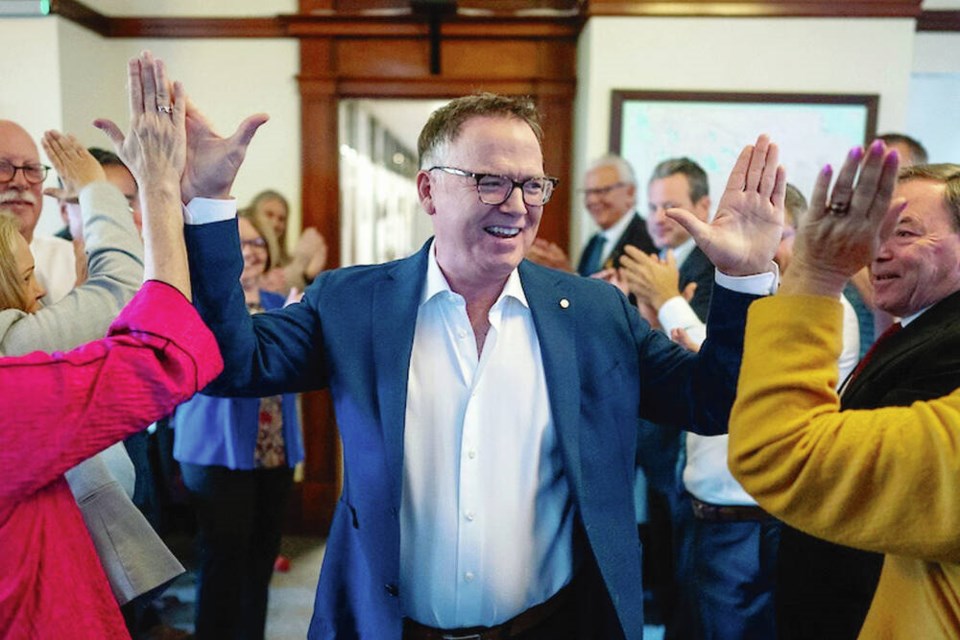Opposition Leader Kevin Falcon thinks he has pushed a hot button on the political dashboard.
After more or less pulling together during the pandemic and opioid overdose emergencies, B.C. Liberals have been trying to differentiate themselves from the NDP since the 2020 election.
Last week, Falcon established a new break point with the government by way of what he called a “dramatic departure” from the status quo. He committed to a new stance on the mental-health and addiction crisis that stresses recovery and treatment first and foremost.
It came at the same time that possession of small amounts of lethally addictive hard drugs was officially decriminalized for a trial period. That was not a coincidence.
Harm reduction has been the dominant philosophy for the last several years.
There are still huge amounts being spent on recovery, but Falcon wants to concentrate far more resources and money into that aspect. Since he formally adopted that as party policy last week, the response has been “overwhelming,” he told reporters this week.
Strangers were stopping him in the street and in coffee shops “everywhere” to thank him for the stance, he said. “I think it’s because it strikes a nerve. Most of the public out there know that what we’re doing is not working. They want to see a different shift in direction.
“I’ve got my real concerns about harm reduction. But I’ve always said I’m open to having that part of a spectrum of services, as long as we’re basing it on transparent and measurable outcomes.”
Liberals on Tuesday started highlighting their differences on the issue at the outset of the legislature spring session.
Falcon started distancing from the widely-supported harm reduction “continuum of care” approach, warning that focusing on supplying addictive drugs and decriminalizing crystal meth, heroin, fentanyl and cocaine “is not going to end well.”
He said the government has an obligation, “through involuntary care, if necessary,” to put vulnerable people on the street into proper care.
After a long preamble, he asked Mental Health and Addictions Minister Jennifer Whiteside if the NDP supports involuntary treatment for people at risk.
She said there was a lot packed into the question. There wasn’t nearly as much packed into the answer. She dodged it a few times, saying there are tools related to involuntary care and government supports care providers who use them.
Liberals cited an example of a parent who was told his daughter might have to be released less than a day after being admitted to hospital, despite the chance she would drink herself to death.
The Opposition said 65 minors have died of overdoses in the past two years, double the rate of previous years.
Oddly enough, there was once a glimmer of agreement between the parties on secure, or involuntary, care for juveniles in the throes of addiction crises.
People are committed now in certain restricted circumstances, but both Liberal and NDP governments have floated extensions of the concept in recent years for youths. Neither of them materialized.
Another point of attack Tuesday was in the details of the decriminalization experiment. The federal government sanctioned it but stressed B.C. must have addiction treatment available to anyone who needs it, particularly in rural areas.
Whiteside said that is being scaled up and there are now 3,200 beds. But Liberal critic Shirley Bond said families all over B.C. don’t have access and are at their wits end. The NDP is just pretending they met the criteria for the decriminalization test, she said.
Frustration continually mounts over the continued high death toll — 11,000 since 2016 — and crime issues associated with addiction. Falcon may have tapped into that by concentrating on stopping addiction, not just coping with it.
But he has promised $1.5 billion more on free treatment services, even while maintaining the whole suite of harm reduction measures.
He said the money will be made up in savings on the “unbelievable” policing, ambulance and court costs that are now incurred because of addiction.
That’s a debatable proposition, given the sketchy record of success when it comes to treating addiction.
The main thing the new stance has going for it is the growing sense of frustration over what the status quo approach has accomplished so far through more than six years of increased resources aimed at an officially designated provincial emergency.
>>> To comment on this article, write a letter to the editor: [email protected]



